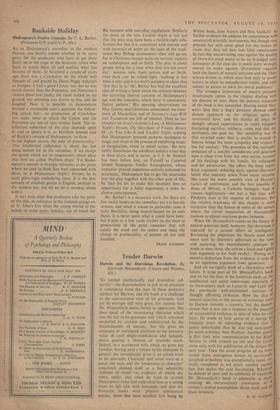Bankside Holiday
Shakespeare's Festive Comedy. By C. L. Barber. (Princeton U.P. and O.U.P., 40s.) As to Shakespeare's comedies in the modern theatre, one hardly knows whether to be more sorry for the producers who have to get them lively on to the stage or the dramatic critics who have to watch them all and explain what has become of them. At Stratford a couple of years ago there was a Cymbeline on the whole well thought of, and graced by Dame Peggy Ashcroft as Imogen; it had a good Cloten, too, but he was much shorter than the Postumus, and Postumus's clothes fitted him badly; the cloak trailed on the ground, our attention was drawn to this, and we laughed. Now it is possible to demonstrate beyond a reasonable man's question the follow- ing special law : no production of Cymbeline can make sense in which the Cloten and the Postumus are not of very similar build. The in- tellectual coherence of the play depends upon it; and to ignore it is, as Matthew Arnold said of Ruskin's version of Shakespeare, `to show . . . to the highest excess, the note of provinciality.' This intellectual coherence is about the last thing looked for in the comedies, if we except the group which are so unignorably about ideas that they are called 'Problem plays.' Yet Shake- speare's comedy is strongly thematic; at the point where we tend to think him least concerned with ideas, in A Midsummer Night's Dream, he is most glitteringly embodying them. It is the first comedy of absolute genius in English, perhaps in the modern era; but all we do is monkey about with it.
It isn't even clear that producers take the point of the title, its reference to the licensed goings-on of St. John's Eve when the young retired to the woods to make erotic holiday, out of touch for the moment with everyday, regulations. Similarly the point of the title Twelfth Night is not just
that the play may have been a twelfth-night cele-' bration but that it is concerned with misrule and with reversals of order on the lines of the tradi-
tional Boy Bishop ceremonies—they still go on, for at Christmas master waits on servant, captain on midshipman and so forth. The play is about people being for a time what, they are not every day: women men, fools priests and so forth; even dark can be called light, 'nothing is but what is not,' and it is a fool's paradox to claim that 'that that is. is.' Mr. Barber has had the excellent idea of writing a book about the relation between the surviving festival customs of Shakespeare's age and the comedies, which have 'a consistently festive pattern.' His opening observations on May Games and Christmas ceremonial, his treat- ment of Marprelate and of Summer's Last Will and Testament are full of interest. Then he has chapters on Love's Labour's Lost, A Midsummer Night's Dream, The Merchant of Venice, Henry 1V, As You Like It and Twelfth Night, arguing that Shakespeare 'presents patterns analogous to magic and ritual in the process of redefining magic as imagination, ritual as social action.' He very subtly illuminates the antithesis holiday every day in these plays, and is clever, as J. I. M. Stewart has been before him, on Falstaff as Carnival turned Scapegoat. Unlike Aristophanes, whose comedies 'present experience entirely polarised by saturnalia', Shakespeare has to get the saturnalia into the play together with the other pole of life; he 'had the art to make this necessity into an opportunity for a fuller expression, a more in- clusive consciousness.'
Mr. Barber's is a necessary work. for there are few useful books on the comedies; yet it is heavily written, and when it comes to particular cases it lacks flexibility, being muscle-bound by its own thesis. It is never quite what it could have been; but it puts us a few yards farther on the road to productions of the great comedies that will satisfy the mind and the senses and resist the charge of provinciality, at present all too well founded.
FRANK KERMODE


































 Previous page
Previous page